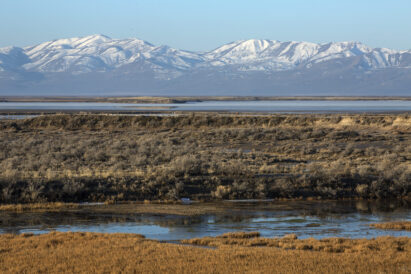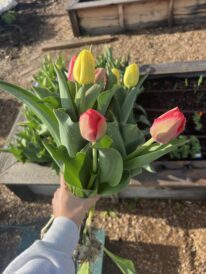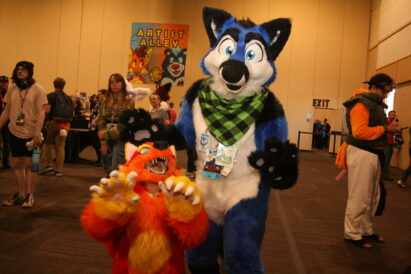Provo warming centers to open starting Sunday despite fire code challenges

Daily Herald file photo
Provo Housing Authority employees Cindy Daley, left, and Pam Liston, right, and volunteers Bethany Gull and her son, Nick Gull, check out a previously identified homeless camp in Provo on Jan. 30, 2015. Organized by the U.S. Department of Housing and Urban Development, the Point-in-Time count is a count of sheltered and unsheltered homeless persons on a single night in January.Warming centers within Provo were expected to open Dec. 1, but roadblocks including fire code requirements and the need for volunteers have delayed their opening.
Homeless service agencies within the Mountainland Continuum of Care network have been working on providing warming centers seven nights a week for those who are unsheltered during the cold winter nights. A warming center is a designated location for those who are experiencing homelessness to have a warm place to sleep.
Through the collaboration of the Continuum of Care, Provo City, local churches, Utah County and the state, the warming centers will officially open Sunday. However, they will only be open on especially chilly nights rather than seven nights a week, due to logistical challenges. These challenges include trying to manage the nearly 84 volunteers needed weekly, not wanting to place the pressure of being open every night on only three participating churches and conflicts with fire code requirements for overnight activities.
House Bill 499, passed last year, requires the Department of Health and Human Services to issue a Code Blue alert when temperatures reach below 15 degrees and allows communities to provide warming centers or extra shelter.
Next week, the warming centers will be open Sunday through Thursday at different community churches. Heather Hogue, project coordinator for Mountainland Continuum of Care, explained the temperatures for next Friday and Saturday nights are expected to be fairly high, which is why the warming centers are not expected to open those nights.
Karen McCandless, CEO of Community Action Services and Food Bank, said while they cannot guarantee it at the current moment, “The intention is to be open every Code Blue night.” She added they are committed to working through any challenges to provide a warm place for the unsheltered on the coldest nights.
The churches donating their buildings to be used as warming centers are Provo Seventh-day Adventist Community Service Center, Provo Community Congregational United Church of Christ and The Genesis Project. The Church of Jesus Christ of Latter-Day Saints will be providing sleeping mats and other commodities needed for the centers but will not be donating any of its buildings.
The schedule for next week is posted on the doors of Community Action Services, and it is being distributed through homelessness agencies, law enforcement and by word of mouth within the homeless community.
The schedule is as follows:
- Sunday: Provo Community Church, 175 N. University Ave., from 9 p.m. to 8 a.m.
- Monday: The Genesis Project, 875 S. 170 East, from 9 p.m. to 8 a.m.
- Tuesday: The Genesis Project from 9 p.m. to 8 a.m.
- Wednesday: Provo Community Church from 10 p.m. to 8 a.m.
- Thursday: Provo Seventh Day Adventist, 255 S. 700 East, from 9 p.m. to 8 a.m.
If there is a Code Blue any time between Sunday through Thursday, it will follow the above schedule in terms of time and location. If a Code Blue alert is issued on Friday or Saturday night, the warming center will be at an irregular location that will be announced when needed until a fixed location can be found for those nights.
One of the major roadblocks that caused the delay was that the churches did not meet the fire code for people to be sleeping there overnight. The churches were not over the capacity of the church, but when the Provo Fire Marshal inspected the churches, he said for people to spend the night a fire suppression (sprinkler) system was needed — specifically, “a system that detects and puts out fires,” explained Isaac Paxman, Provo deputy mayor.
Paxman said the fire marshal only became aware of the possible fire code violation when news of the warming centers was made known through the media and press releases.
McCandless said those involved in setting up the warming centers were surprised when the fire marshal brought up the code violations, as they were unaware of the requirement. The Continuum of Care was told a week or two ago about the fire code requirements. Then a few days ago, they received word that the fire marshal had found a way they could open the centers.
The solution is that the churches must follow certain fire safety tactics. To be open, they must have smoke detectors; everyone must have the free ability to exit the building quickly, meaning no deadbolt locks; and a fire watch program must be in place, which consists of at least one competent adult being awake to watch for fire.
McCandless explained it was not a case of the city saying, “Gotcha,” to catch them violating fire code. Rather, they realized it was an issue and they worked together with the city to find a resolution.
The fire code did not change, and the churches do not yet have sprinkler systems, but they came to a decision together that would keep those who are unsheltered out of the cold and safe from fire danger.
“The city has been willing to work with us,” McCandless said. “Nobody wants anyone to die, whether it’s by fire or cold. We never wanted the city to look the other way on fire code. We would never ask them to do that.”
The temporary solution to meet the fire code will last through this winter. By next winter, the churches must be fully compliant with the fire code to operate as a warming center.
“I’ve heard from representatives of each of the churches positive feedback on this approach and gratitude that they’re going to be able to move forward with this position,” Paxman said. “And I will hasten to add Provo City and the Provo City mayor’s office is enormously grateful to these churches, to these pastors, to the volunteers, to the Continuum of Care and their leadership. This is not something a city can pull off. This is what makes our area so great is we have private charities and good people all around and churches who step up and come up with solutions and, then we work together to figure out how to make it work best for everybody.”
Churches willing to risk the fine
Under H.B. 499, Utah, Davis and Salt Lake counties are required to develop a winter response plan for the winter of 2024 that provides shelter for homeless people from October through March, seven nights a week. These warming centers were part of preparing for the winter response next year.
“I’m hoping this year will be the beginning of this more permanent solution to having some place for people to go during the winter,” McCandless said.
There have only been a couple of official Code Blue nights this winter in Utah County, and although the warming centers were not yet open, the city and county still responded to the alert. Community Action Services has been working with local motels to house as many unsheltered people as possible on these Code Blue nights. They prioritize families with children, people over 65 or people with disabilities to be placed in a room first. Then they house others as space permits, McCandless explained, although she said they are not able to find housing for everyone.
The Genesis Project also has helped by hosting movie nights when there is a Code Blue alert.
Hogue explained the delay in opening the warming centers even for Code Blue nights, “We were able to open Genesis Project’s movie nights on Code Blue, but until we had clarity on fire code for overnight occupancy, and not just as a community event, it had not been possible to open.”
Paxman said no fines have been imposed from the city, and the new solution from the fire marshal allows the churches to operate as warming centers during Code Blue while they work on becoming fully compliant with the fire code.
Although the churches no longer have to worry about being fined, some of the churches were willing to open and risk the fine to give unsheltered people a warm place to sleep.
McCandless said, “I can’t speak for all the churches, but part of a lot of church ministries is to help those who are unhoused. So, churches felt that this was literally part of their ministry, and if it’s part of their ministry and their ability to worship and help people as they believe, then they were willing to.”
Financial help and volunteers needed
The Continuum of Care, Provo City and local churches are currently trying to figure out how to fund the sprinkler systems needed in the churches. Provo Seventh Day Adventist already has a fire suppression system, but the other two churches do not. McCandless said they are exploring options including asking the community and other churches for support.
“Churches should not pay for that,” McCandless said in regard to who will pay for the fire suppression systems. “Let’s see what we can do as a community, because the other churches have already stepped up to do this and they’re willing to house individuals through the night. Let’s see what we can do as a community. … These churches don’t have a lot of financial resources.”
The Continuum of Care needs help in more ways than just financially.
“It’s critical that we operate safely, so we’ve delayed opening to work through these issues,” Hogue said. “Because of the uncertainty that we have had in dealing with these unforeseen fire code issues and what the time frame for opening has been, we’ve had to delay our recruitment of volunteers and we’re still in need of community support.”
Volunteers are needed to operate the warming centers and sign up to be on-call volunteers for Code Blue nights. People can sign up to volunteer by emailing kenam@casfb.org.
Not only will these warming centers help keep people out of the cold, but McCandless explained it also will help “create an opportunity for the community to come together to help those experiencing homelessness. I think it’s going to help build our community. I think that it’s going to help build some bridges that haven’t been there before.”
She explained there have not been many opportunities to build bridges in the community for community members to help those experiencing homelessness such as volunteering. “There are going to be opportunities for the community to better understand homelessness, and we’ll be saving lives, which is wonderful. That’s the top priority is to make sure nobody dies; that’s what drives all this,” McCandless said.



